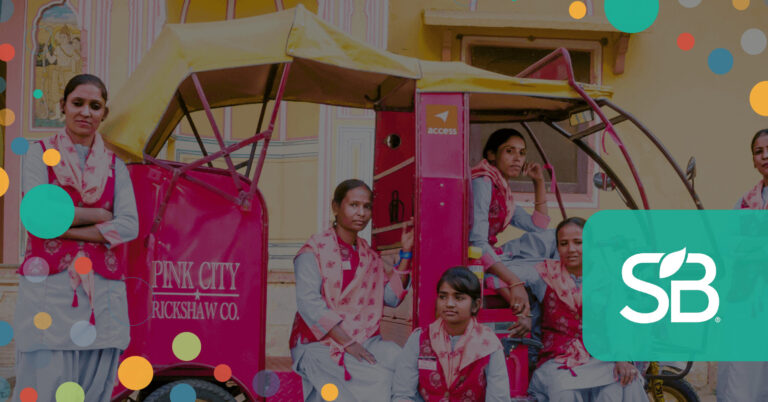India ranks among the lowest when it comes to women’s economic participation and equal access to opportunities, but a growing number of tourism-based initiatives are helping create a level playing field for women.
“Have a great holiday!”
Renu Sharma greeted me with a warm smile and took my hand in hers. She had two bangles on each wrist and her hair pulled back in a perfect bun. She exuded a stress-free cool vibe that was difficult for me to embody in the incessant honking and 90°F heat of Jaipur, India. As I slid into the cushioned back seat of her pink rickshaw, Sharma put on her sunglasses, started the engine, and we set off on a heritage tour of India’s famous “Pink City.”
Like many Indian cities, Jaipur relies on its fleet of around 30,000 rickshaws to get around. Among them, the 20 rickshaws owned by the Pink City Rickshaw Company stand out not only for their colour but also because they are the only ones driven by women.
Launched in 2017, Pink City Rickshaw Company is a women’s empowerment initiative supported by nonprofit ACCESS Development Services. It employs more than 60 women from low- and middle-income families. They provide 30-40 rides a day, all of which are quality city tours rather than just point-to-point services. Sharma is the chairman who oversees the day-to-day operations and has been with the initiative since the beginning.
“I am very happy about this project,” she said through an interpreter. “Being rickshaw drivers will improve the economic situation of these women.”
According to the World Economic Forum, India ranks among the lowest in women’s economic participation and access to opportunities. Very few women hold decision-making positions in the private sector, including in the tourism industry. And women who belong to marginalized communities based on class, caste or religion have a harder time gaining meaningful employment.
“In India, women face multiple barriers that prevent them from accessing education, employment and other opportunities,” said Priyanka Singh, Planeterra’s community tourism project manager for Asia Pacific.
Common barriers include social and cultural norms, gender-based violence and safety concerns, difficulties in accessing tourism tools and resources, limited access to education and career opportunities, etc. Initiatives such as Pink City Rickshaw intentionally address these barriers and help close this gap.
“We earn better than women working as domestic workers,” Sharma said, “plus, this work is less time-consuming, more flexible and gives us dignity.”
As tourism continues to grow, especially in India, it is a natural avenue for empowering and employing women.
“Tourism offers a wide range of employment opportunities including hospitality work, tour guiding, homestay hosting, restaurant management, transportation and handicrafts,” Singh said. “Through active participation, women can gain access to formal employment, earn an income and achieve economic independence.”
“Tourism jobs are uniquely positioned to offer transferable skills across industries, such as language learning and customer service. Additionally, women in India play a vital role in preserving and promoting our cultural heritage, including traditional crafts, cuisine and performing arts,” Singh said.
I experienced this in Delhi, where I spent the morning with Shumaila, a guide from No Footprints, who took me through the heavily Sufi neighborhood of Nizamuddin Basti and introduced me to the women who make and sell intricate paper crafts with the help of a cooperative called Insha-e-Noor.
The efforts to support women don’t stop there. In Agra, we enjoyed a casual lunch at Sheroes Hangout, a cafe that employs female victims of acid attacks. Women With Wheels, supported by Saka Consulting Wings, employs women from “restricted and resource-poor” backgrounds. In Sunder Rann, Rajasthan, 30 women from different castes have come together to work on embroidery, sewing, weaving and beadwork projects.
And in Kerala, Planetara worked with 10 women to develop a dining experience for tourists, a project that started with a community hall and a dream.
“We went from a group with zero experience to now a group of empowered women who are more confident and open to travelling with their itineraries,” Singh said. “This is a great example of not just economic empowerment but also the social and cultural aspects – the celebration of culture and the power of female-led community experiences.”
Back in Jaipur, Sharma drives a rickshaw from Ajmeri Gate into the old city and onto shop-lined streets. We take a break for kulfi and mango lassi, a refreshing treat to beat the heat. As Sharma and I make our way through Jaipur, traffic is particularly bad because of Holi, but she navigates the choked traffic like a pro.
At one point, we were completely stuck. The male driver of the car next to us rolled down his window and asked Sharma for directions. She pointed this way and that. Wiggling his bangle-clad wrist in the air, he indicated where to go. Just as he thanked her, a gap magically appeared in the traffic ahead. Sharma stepped on the gas, and our pink rickshaw kept going.
(Note: Intrepid Travel hosted my experiences with Pink City Rickshaw Company and Sheroes Hangout. No Footprints hosted my Basti Sisterhood tour in Delhi.)
Release date: July 3, 2024 at 8am EDT / 5am PDT / 1pm BST / 2pm CEST

Joanna Haugen Founder
Rooted
Joanna Haugen is an author, speaker, and solutions advocate who has worked in the travel and tourism industry throughout her career. She is also the founder of Rooted, a solutions platform at the intersection of sustainable tourism, social impact, and storytelling. A retired US Peace Corps volunteer, international election observer, and intrepid traveler, Joanna uses her strategic communications skills to help tourism industry professionals decolonize travel and support sustainability.

